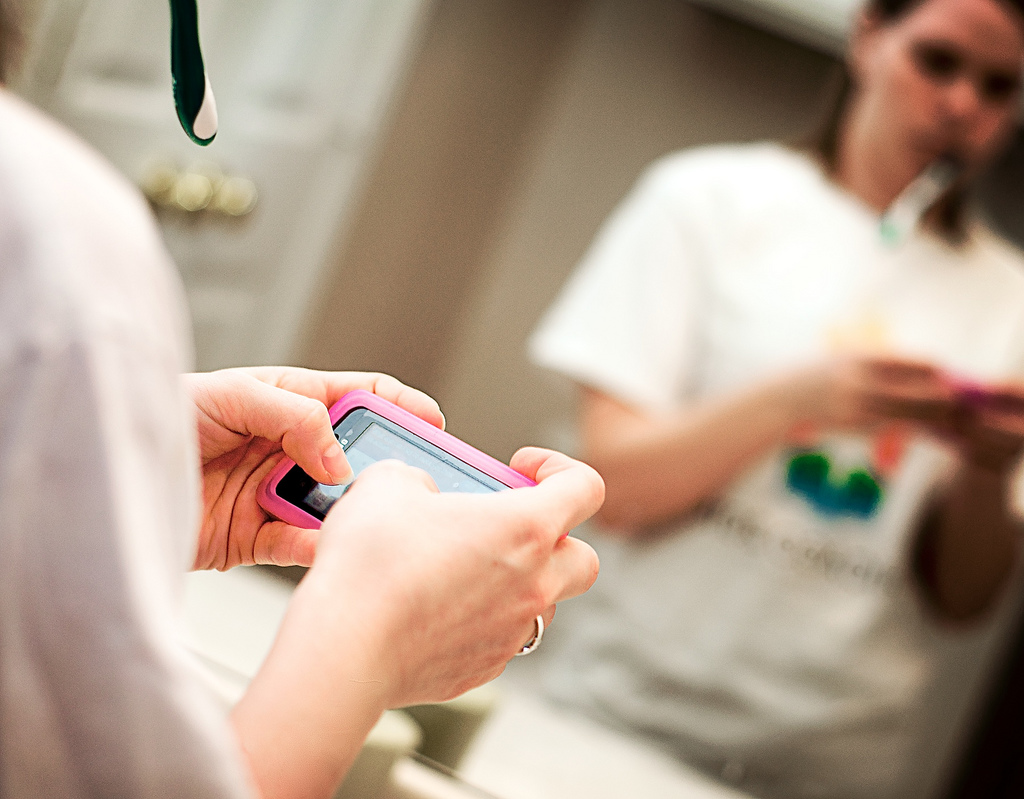
The Internet has become a part of much of our daily lives—we can pay bills through online banking, comment on a friend’s vacation picture on Facebook, look at Google Maps’ street view pictures of the zócalo in Mexico City, read a news story from an outlet thousands of miles away from our hometowns about the kidnapped Nigerian school girls, and even join in the social media campaign by tweeting #BringBackOurGirls. There’s no doubt our world is more connected—but what kinds of connections are we making with other people in this more connected world? And how can we make these connections deeper, more enlightening, and more cosmopolitan than they are right now? These are key questions Ethan Zuckerman explores in Rewire, the winner of this year’s Zócalo’s book prize. On the occasion of Zuckerman’s visit to Zócalo, we asked experts to consider: What do we need to do to help the Internet connect us to others in a more meaningful way?

Mindfulness creates meaning. That sounds like a Zen koan, but it simply means that it’s hard to connect with people when you’re not really paying attention to them. You might not fully process the conversation, miss what they’re really trying to say, and deny yourself the chance to answer wisely.
We sometimes have trouble making meaningful connections online for a couple reasons. First, the Internet has evolved into a weapon of mass distraction. Games like Candy Crush Saga and Farmville try to get us addicted, then spam our friends until they’re hooked. Social media companies do a great job designing interactions to be automatic and a little mindless; as a result, we tend to spend more time online (which is good for them), but spend it less meaningfully (which is not so good for us).
Second, we often use the Internet in ways that reduce our own capacity for attention, or sensing subtexts in a conversation, or speaking from the heart. Multitasking, texting while doing other things (not driving, please!), dividing our attention between conversations at work and with friends—these practices spread us thin and make us superficial.
The good news is, none of this is cast in stone (or bits). We don’t have to be mindless on social media. With practice, we can stay on the web without being tangled in it. Even observing simple things, like our unconscious habit of holding our breath while waiting for screens to load, makes us more aware of how technologies stealthily shape our behavior, and puts us back in control over our devices. Learning the tricks designers use to make us more superficial, paying attention to our own moods and modes of online behavior, focusing on quality rather than quantity, and remembering that there are always real people on the other side of the screen, can help us be more meaningful online, and be better people all the time.
Alex Soojung-Kim Pang is author of The Distraction Addiction (Little, Brown & Co., 2013) and an evangelist for contemplative computing.

As Ethan Zuckerman shows so convincingly in Rewire, the Internet has made the world accessible to us, but we’re choosing to stay with what’s familiar. This is not simply a human weakness. Cultures form and conversations are possible only when there is an enormous base of shared interests and expression. But it’s vitally important that we recognize and embrace the differences among us.
It seems to me that increasing our serendipitous encounters as some suggest is only a part of the answer. There are plenty of opportunities for serendipity on the Net, but we ignore them the way we ignore irrelevant results when we’re using a search engine. Serendipity is of no use if you’re not interested in what you’ve run into. How do you make someone interested in something that at first seems of no relevance? One way is to write well. Good writing generates interest. Since the Net has shown us that we can’t assume people will be interested in what is foreign to them, we should invest in supporting and publishing writers who can create that interest.
Second, we should all be ambassadors not just for particular places we care about, but for the idea of hospitality itself. In our every Internet posting, we can model the act of welcoming strangers, exhibiting our enthusiasm for what is different from us.
Third, we should push the big Internet sites like Facebook and Google to present us not only with what they think is safely within our interest zone, but what borders on that zone.
Here’s another recommendation: read Ethan’s thoughtful and thought-provoking book.
David Weinberger is a senior researcher at Harvard University’s Berkman Center for Internet and Society. His latest book is Too Big to Know.

Clearly, the Internet can help us foster and maintain meaningful relationships. Many people have had relationship-building experiences online such as meeting someone over the Internet who becomes special to us, reconnecting via social media with a friend with whom we had lost touch, and using digital tech to find people to meet up offline on short notice for a drink or an impromptu game of hoops.
But sometimes dissonance hits when we are posting a happy-toned update on social media and realize we actually feel sad. Some days, reading online updates from friends leaves us feeling distanced from them rather than closer to them. And loneliness can overtake us even in the process of interacting online, such as when we feel too tired to text much less talk, and find ourselves wishing we could simply enjoy a companionable silence with someone who knows us well.
Recent research is showing that to optimize meaningful connections and minimize the dissonance, distance, and loneliness we sometimes experience online, we must unplug regularly to enjoy both contented aloneness and undistracted face-to-face interactions. Solitude and in-person interactions center and nourish us in unique ways, honing the self-knowledge and relationship skills that we bring to online interactions.
We must also become more mindful about when and how we use digital media to interact with others. Broadcasting trivia about ourselves accomplishes some things, but rarely leads to a sense of meaningful connectedness. Finding ways to communicate more transparently—but more narrowly—online with people we know well and trust is a key to cultivating deeper connections. For instance, invite a handful of friends to agree to create a private communication space online in which to share things going on in your lives that you might not want to post openly. Meaningful connections online flow from bringing more of your whole self into ongoing interactions with people you trust, and inviting them to do the same.
Kirsten Foot is an associate professor of communication at the University of Washington and the author of an open-access article on the online emergence of pushback on social media. Foot and colleagues are currently studying visual images of resistance to digital media that people post online.

Back in the late 1960s, when the U.S. Defense Department was funding the design of the Arpanet, the Internet’s predecessor, nobody was thinking about nurturing meaningful connections between people. Instead, it was about humans connecting to remote computers to access data and computational resources. Nonetheless it only took a couple of years for e-mail to emerge and quickly become the dominant use of the network. It’s worth considering that in 1972, if you were online, you could e-mail people and tell them, for example, that you loved them. That’s a pretty meaningful connection, and it was, from a technology standpoint, possible over 40 years ago on a network designed by the military, for official business.
Which is to say, in 2014, if we’re failing our own ideals of how meaningful our connections with others should be, it probably isn’t a technology deficit. The framework for meaningful interaction has been here, in some form, since e-mail. Nor is it likely to be a policy problem, barring any disastrous turns. For us—and I mean the people who share my experiences, online access, and privilege; the people who are frequently presented as the norm—an infrastructure that can sustain more meaningful connections is in place. What we need to do is to be clear with ourselves about how we want to relate to others, and about the kind of society that might support those ideals. Maybe that means organizing a poetry club at the office or maybe it means getting in the habit of video chatting (or just e-mailing!) the extended family every Sunday night. Sure, the Internet of a decade from now will make it even easier, and the e-mail of 1972 was clunky. But today, right now, whatever small things work toward your ideal, whatever steps make you feel more a part of something, the Internet is ready to go.
Bradley Fidler is a researcher with the UCLA computer science department, where he studies the social and economic dimensions of networked computing and the Internet.



